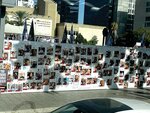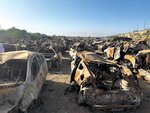

Tel Aviv was filled “with a sense of somberness,” said Rabbi Daniel Levin, of Temple Judea in Doylestown, after recently returning from a Solidarity Mission trip to the city.
“It was markedly different from previous visits,” said Levin, who traveled to Israel with Rabbi Charles Briskin, of Shir Ami in Newtown, and Rabbi Jason Bonder, of Congregation Beth Or in Maple Glen, on a Jewish Federation of Greater Philadelphia-sponsored trip Nov. 5.
In the past, the muted city streets were filled with people shopping and going to and from work, said Briskin. Although the city was not as bustling as before Hamas launched its horrific assault on the country Oct. 7, the Israelis’ resiliency was also on display, stressed the rabbis.
“There is still life there,” said Bonder. “It wasn’t really like the news” portrays the city of more than 400,000 along the Mediterranean Sea. “Together we will win,” was heard often, the rabbi said.
Throughout Tel Aviv, photographs, signs and tributes supporting the approximately 240 hostages and their families lined many streets, said Briskin. Large white stuffed bears, stained with red paint resembling blood, some wearing blindfolds, were also on display.
“It’s different to see it with your own eyes,” Briskin added.
“At the time of the war,” said Levin, “it was an extraordinary blow to the psyche…to see a place I love so much, I was full of emotion. There’s a profound sense of loss.”
Bonder too, said the visit changed him. He played baseball in Israel as a youth and returning now, he said, “I feel more connected to the people of Israel. It felt important to be there.”
As part of their two-and-a-half- day Emergency Solidarity Mission, the men met with families of hostages and others to offer pastoral care, but, the Rabbis agreed, what the people they saw needed most was someone to listen.
“They just needed our ears,” said Bonder. “They are in need of witnesses. They are searching for people to hear their stories and share them, to go forth and tell them.”
In the midst of war, said Levin, “people need time to mourn, to feel trauma. We gave them a space to unpack and tell their sacred story.”
Seeing walls riddled with bullets and lots filled with the blackened shells of more than 1,000 cars burned by Hamas terrorists who torched them and fired at them while people were inside, the horror of the attack became more real.
“It’s an image I’ll never forget,” Briskin said, of the hollowed out vehicles. “One person said it reminded him of his visit to Auschwitz.”
With the war raging on, Briskin pointed to not only the resiliency and unified spirit of Israelis, but to the many acts of heroism in the country. One man, he said, told him of making 30 trips in his car to save people fleeing the slaughter at the music festival, where Hamas first struck.
“I feel privileged to have heard these stories first hand,” said the Rabbi.
Reflecting on the emotionally charged trip and the fierce ongoing battle in Gaza, where thousands of civilians have died, Briskin said he understands there is suffering for both Palestinians and Israelis.
“Our visit was very focused,” said the Rabbi, “but there can also be concern for Gaza and Israel. We can feel the pain of both communities.”
Join our readers whose generous donations are making it possible for you to read our news coverage. Help keep local journalism alive and our community strong. Donate today.